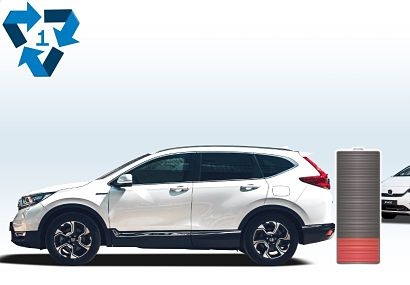
The pan-European arrangement will see SNAM collect and recycle batteries from Honda's increasing number of hybrid and electric vehicles and either potentially prepare them for 'second-life' renewable energy storage uses or extract valuable materials for recycling if they are not suitable for that purpose.
Honda and SNAM have worked together since 2013, to ensure the traceability of end-of-life batteries and dispose of them in accordance with European Union environmental standards. The expansion of this agreement will see SNAM collect Lithium-ion and Nickel Metal Hydride (NiMH) batteries from across Honda's dealer network and Authorised Treatment Facilities (ATF) in 22 countries, before analysing how suitable they are for recycling and processing them accordingly.
“As demand for Honda’s expanding range of hybrid and electric cars continues to grow so does the requirement to manage batteries in the most environmentally-friendly way possible” said Tom Gardner, Senior Vice President at Honda Motor Europe. “Recent market developments may allow us to make use of these batteries in a second life application for powering businesses or by using recent improved recycling techniques to recover useful raw materials which can be used as feedstock into the production of new batteries.”
Safe and low carbon transport is utilised for the collection of used traction batteries. On arrival, SNAM assesses which battery packs are valid for inclusion in a new energy storage device. These are then repurposed and made available by SNAM for domestic and industrial applications.
When battery cells are damaged and unsuitable for ‘second life’ applications, materials such as cobalt and lithium can be extracted using hydrometallurgy techniques involving the use of aqueous chemistry. These can be reused in the production of new batteries, colour pigments or as useful additives for mortar. Other commonly used materials including copper, metal and plastics are recycled and offered to the market for use in the production of a variety of applications.
Dealers can arrange and request the collection of end-of-life batteries for treatment and recycling through SNAM's dedicated online platform. Collection can be arranged from centralised storage hubs within 15 working days, so that dealers do not have to store batteries at their premises. The agreement applies to large ‘traction’ batteries used to power motors in hybrid and electric vehicles, as opposed to smaller batteries used for ignition in petrol or diesel cars.
SNAM is supportive to Honda’s activities on eco-conscious design of future batteries, so that the environmental sound treatment of these batteries at the end of their useful life can be guaranteed.
For additional information:

